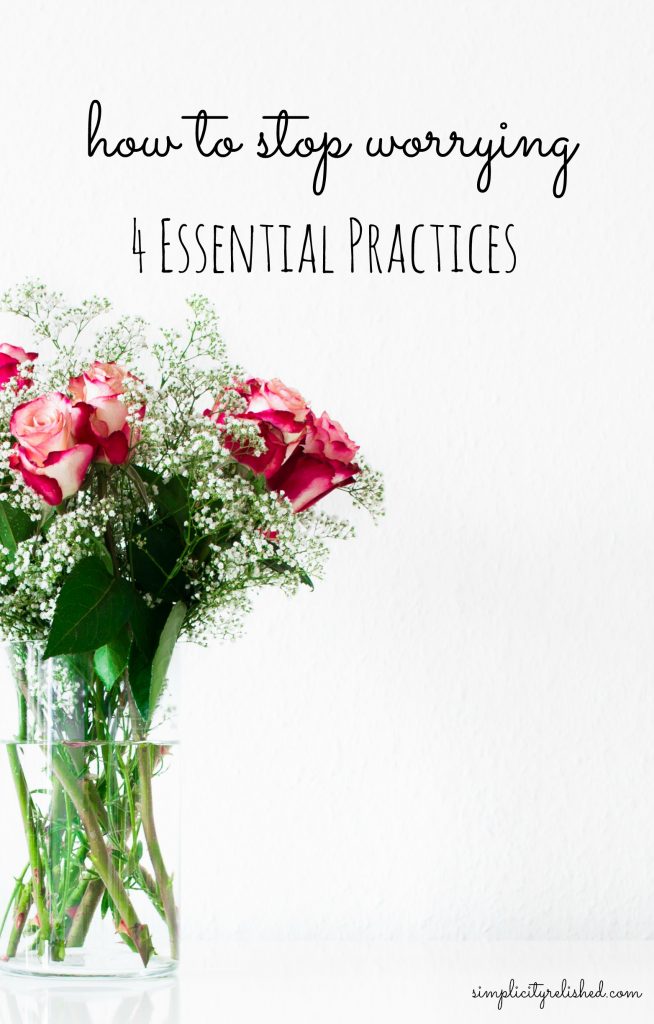“I can’t stop worrying about this.”
“I’m worried that it’s not enough.”
“I did everything I could, but I’m still worried.”
These words are familiar to us because we’ve probably said them at one point or another. Worry is a default mental state that occurs whenever we want to have 100% control over an outcome– but we can’t.

Before we discuss how to stop worrying, though, let’s discuss why worry is such a destructive thing.
- Worry doesn’t change the situation. It only makes us feel worse.
- Worry distracts us from the present: keeping us from enjoying positive moments throughout the day.
- Worry keeps us from thinking big and taking risks.
- Worry puts us in a bad mood, often affecting our relationships and even our performance.
- Worry doesn’t acknowledge that others might come through for us; it keeps the weight firmly on our own shoulders.
Ultimately, worry is simply our mind’s way to obsess over a particular situation without making any real progress. And it takes a good deal of self-control in order to pass on worry. Here are some things you can do to keep worry at bay.
How to stop worrying
1) Choose intentional dialogue– with others and with yourself.
There are internal worriers and external worriers, and people like me who do both. If I’m really consumed with something, I’ll turn it over in my head constantly. And then as soon as I make contact with another human, I’ll probably talk about it. Over and over again.
Intentional dialogue means thoughtfully engaging the issue with a real desire for progress. If something causes you to worry, choose a few core friends to discuss it with. Be honest with them, listen to their advice, and consider how their thoughts might influence your next step. Worry often exhibits itself in the form of complaining and ranting– stay away from doing that. Let your friends help you reframe the situation.
Internally, it’s just as important to have the right dialogue. Write down the situation and think it through, but keep from assessing it. Praying or meditating is a good way to refocus your mind on the truth.
2) Rest, don’t numb.
When was the last time you truly rested? What did that feel like?
Did you spend the day on a hiking trail with someone you love? Or did you curl up with a good book and your favorite hot beverage? True rest is a thoughtful decision to care for yourself holistically. And this usually means it’s not a binge of any kind: not watching hours of television, or drinking too much alcohol or eating massive amounts of food you know you should not eat. True rest leaves you feeling refreshed, re-inspired, and reinvigorated for the tasks at hand.
Numbing yourself, on the other hand, usually makes you feel worse. And if you have something that causes you worry, an act of numbing will likely make that worry even more severe.
3) Take extra care of your physical and emotional health.
When we’re worried– especially if the source of worry is something that takes a lot of time– we often think it’s okay to neglect our self-care. We choose convenience over healthy eating, we choose hustling over exercise, and we choose constant problem-solving over feeding our soul. Even our time with friends or loved ones can end up consumed with worry.
Furthermore, there’s no time when we need our self-care practices more than during a demanding season. Whether we choose to continue these positive disciplines can make or break the outcome of our endeavor. Caring for ourselves ensures we’re able to stay strong through whatever storm may come barreling through.
4) Recognize your responsibility and that of others.
Regardless the type of situation causing you worry, it’s unlikely that you are either 100% responsible or 0% responsible. You probably have a role to play, but you’re not the only one. In order to problem-solve effectively, it’s imperative to understand what you can and can’t control. Taking the best steps forward is an act of courage, not of worry.
Worry enters the scene when we either leave no room for anyone else to influence the situation, or when we insist on not having any agency at all. Both are twisted perspectives on what is probably true: we need to recognize our responsibility and do our best, leaving the rest up to others.
The bottom line: Worry is not unconquerable.
Unlike introversion and extraversion, worrying is not a part of anyone’s personality. While we can’t keep difficult situations from unfolding, we can choose not to worry.
[Tweet “4 essential practices to stop worrying now! via @daisysrosales”]


Thank you so much Annie, that means a lot! I wrestle with numbing vs. relaxing on a regular basis… glad to be in this together!
Daisy– I loved this so much. I feel like this post was tailor written for me and the season I am in. I would love to read a post from you about ways to TRULY relax and not just numb. That point resonated with me and I would love some ideas on how to implement that in my own life.
Hey Edye! Thanks for reading! 🙂
Wow. That’s a really tough situation. Glad to hear you’ve been calm at other times!
You’re so right, Kristal!
Thanks Mica! You’re so right, it’s usually not worth it.
So great to hear that, Marc. It can be easy to fall into that type of spiral.
Haha glad to hear I’m not alone!
Yeah for sure. True rest can be elusive unless we’re intentional!
I am like you, Daisy. I worry about things in my head and then discuss them to death with other people. Bless my sweet husband and best friends.
Thank you Daisy! I read a lot of blogposts – this one had so much wisdom and arrived at a time that was magical for me. Seeing and realizing the following,- immediately ended a wicked spiral of anxiety that could have lasted weeks –
“In order to problem-solve effectively, it’s imperative to understand what you can and can’t control. Taking the best steps forward is an act of courage, not of worry.”
I will now enjoy looking around your site and at your content. I already see that your layout and style of webpage design is very beautiful and relaxing. Wonderful images!
This was a wonderful post. I really loved your point in #4 “it’s imperative to understand what you can and can’t control” This has always been the key for me. I am a worrier by nature, but when I remind myself that I have done everything I can and the rest is out of my control, I am able to let go of the worry.
Such a great post! I’m prone to worrying about everything. I’ll totally put your tips to use 🙂
Blessings,
Edye | gracefulcoffee.wordpress.com
I am not a worrier during my whole life I can only remember one stage that was spent worrying that was when my second daughter was a teenager she was a wild child who got mixed up with some dangerous people those few years where terrible.
This was a great post – especially the advice about healthy resting! I am a worrier for sure and it can be difficult to step back and reframe it, but necessary and something that gets easier to do with practice. All the worry is usually never worth it!
Away From The Blue Blog
I am definitely a worrier (thanks, Mom) and I try my best to not let worry take over my thoughts daily or keep me from living my life to the fullest. I definitely need to try to rest more, in the “true rest” kind of way…not the binging Netflix kind of way! ha!